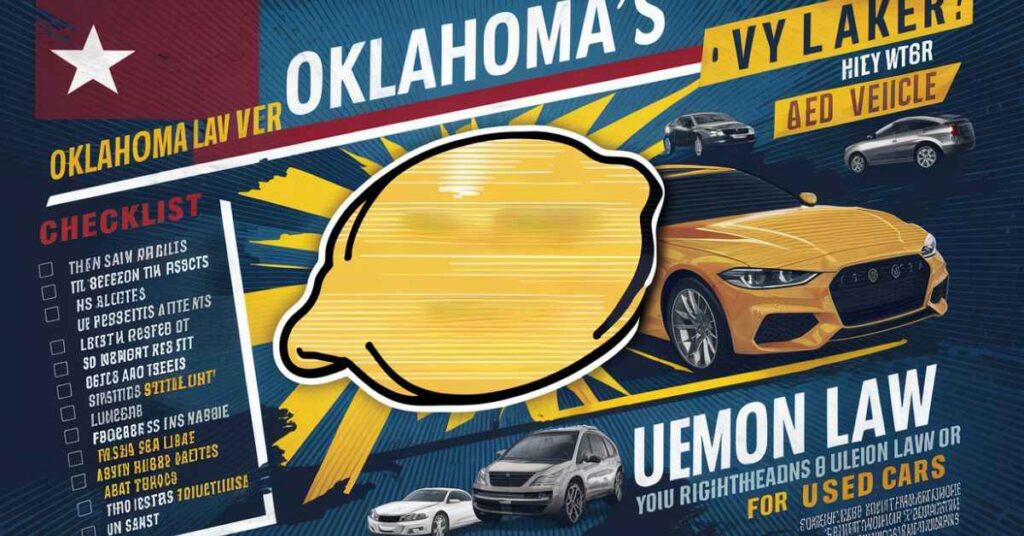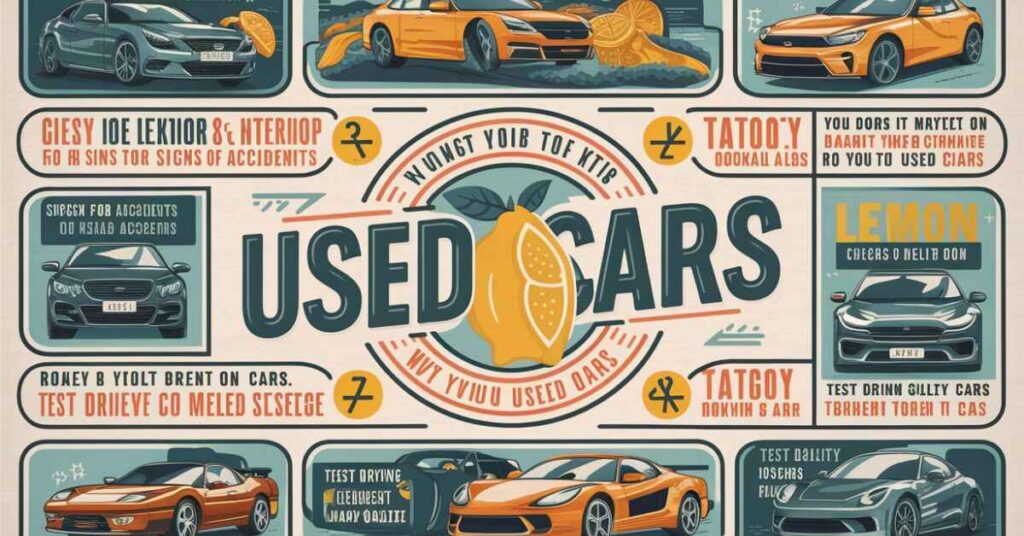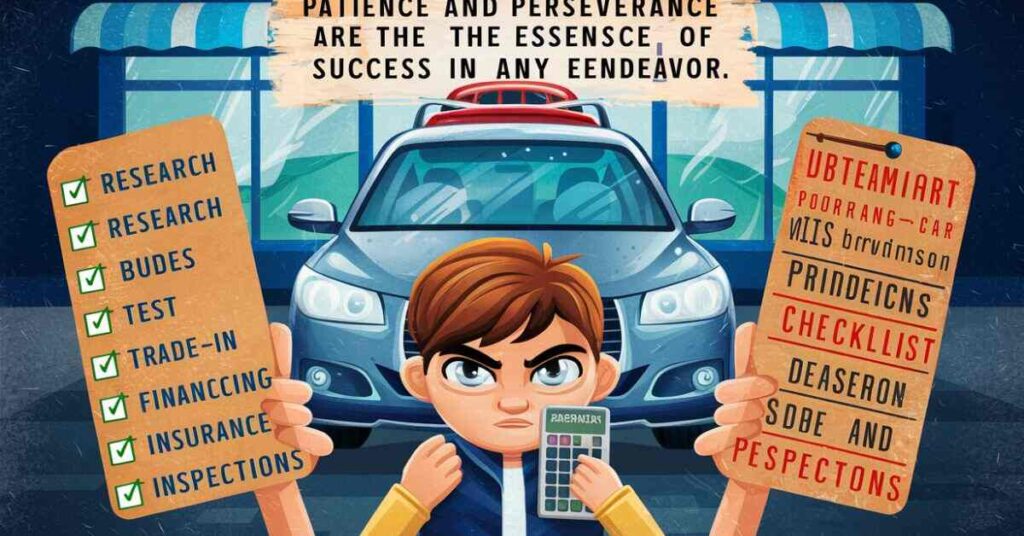There’s nothing quite like the sinking feeling when you realize your great deal was actually a lemon in disguise. You’re not alone thousands of consumers fall victim to shady dealership practices every year.
But in Oklahoma, you don’t have to grin and bear it. The state’s Lemon Law provides powerful protections for folks like you stuck with a defective ride.
In this comprehensive guide, we will dive deep into the specifics, outlining step-by-step actions to take when the dealership sold you a bad used car.
From understanding your consumer rights to launching a legal offensive, we’ve got you covered. So, take a breath, grab a notepad, and let’s get rolling.
Understanding Oklahoma’s Lemon Law for Used Cars

Oklahoma’s Lemon Law does not just apply to new vehicles used car buyers can also cash in on these vital protections. But what exactly constitutes a lemon, Under state law, a used vehicle may qualify if.
- It has defects or conditions that substantially impair its use, value or safety.
- The problem(s) occurred after purchase.
- You’ve made a reasonable number of attempts for the dealer manufacturer to repair or correct the defect(s).
What determines a ‘reasonable number’? The law doesn’t provide a magic number, but it does specify criteria:
- The same defect was subject to repair four or more times, and the issue still exists.
- The vehicle was out of service for 30+ calendar days due to repair attempts for one/more defects.
In short, if you’ve given the dealer ample chances to make it right and the ride is still a rattletrap, you may have a legitimate lemon on your hands.
Read This Blog:
Who Buys Car Batteries For Cash
First Steps After Purchasing a Defective Used Car

So your great deal turned out to be a dud. As frustrating as it is, try not to completely blow a gasket just yet. Instead, take a deep breath and embark on these crucial first steps:
- Document, Document, Document
The moment you notice an issue, start a paper trail. Jot down every problem, strange noise, defect – no detail is too small. Log the date, mileage, who you spoke with, and what was done. Keep repair orders and receipts organized in a dedicated folder.
- Get a Second, Professional Opinion
Don’t rely solely on the dealership’s mechanics. Enlist an independent mechanic to inspect and diagnose the issues objectively. Their assessment provides third-party validation of the car’s condition.
- Review the Sales Contract Carefully
Read every word of your vehicle purchase agreement. Look for warranties, service contracts, or guarantees that the dealer is obligated to honor. The services they’re required to provide could resolve the situation amicably.
- Give the Dealer a Chance to Make it Right
Before jumping to legal action, approach the dealer first with your findings and documentation. Outline the issues professionally and request they repair, replace, or buyback the vehicle per the Lemon Law. If they refuse or are unresponsive, then it’s time to escalate.
The Paper Trail is Crucial
One key piece of advice that cannot be overstated: document every interaction, conversation, and detail meticulously. A solid paper trail demonstrating a pattern of defects and failed repair attempts is your greatest ally under the Lemon Law. It shows you’ve held up your end and given the dealer sufficient chances to make it right.
Tools like a designated notebook or cloud storage can keep everything organized. Don’t simply rely on your memory – get it all in writing. This preparation will be invaluable if you need to enter Lemon Law arbitration or legal proceedings.
Dealing With an Uncooperative Dealership
In an ideal world, the dealer would own up to their mistakes, act professionally, and resolve the situation fairly. But we don’t live in an ideal world, if they’re giving you the runaround or flat out refusing to help, it’s time to escalate.
Consult With a Lemon Law Attorney
Lemon laws are quite complex, so pitching your case to an attorney who specializes in this area is wise. They’ll evaluate if your situation meets the Lemon Law criteria and outline your options clearly. Many offer free consultations, so you have nothing to lose in seeking expert guidance.
Pursue Mediation or Arbitration
The Lemon Law dispute process often begins with mediation or arbitration before escalating to court. A neutral third-party negotiator will hear both sides and try facilitating a compromise resolution that works for everyone.
Look Into State Assistance Programs
Some states offer free mediation services or Lemon Law arbitration overseen by the Attorney General’s office. Exhaust these free resources first, if available.
Consider Legal Action
If arbitration fails to produce a satisfactory result, you may need to file a formal Lemon Law lawsuit against the dealer/manufacturer. This is where having an experienced attorney is invaluable for navigating the tricky legal waters.
Submit Complaints to Authorities
Don’t hesitate to file complaints with the Oklahoma Attorney General’s Consumer Protection Unit and other relevant state agencies. The more parties involved applying pressure, the better your chances of being made whole.
The Power of Perseverance
Lemon law cases can be an uphill battle, with dealers and manufacturers hoping you’ll simply give up out of frustration. Don’t fall into that trap! The key is persevering through every possible resolution channel, no matter how arduous. With a solid paper trail, some expert legal guidance, and sheer determination, you can absolutely emerge victorious.
The bend in the road is not the end of the road, unless you fail to make the turn. Anonymous
Potential Resolutions Under Oklahoma’s Lemon Law
So what can you actually get if the dealer sold you a certified lemon under Oklahoma law, The three primary remedies are:
- Refund of Purchase Price
You may be entitled to a full refund of the purchase price, including any fees or down payment. The refund amount is calculated by the formula:
Purchase Price – Allowance for Used Vehicle Use = Refund Amount
The “allowance” is meant to compensate the dealer for the number of miles you drove the vehicle before issues arose. It’s calculated at the rate of $25 per 1,000 miles of use beyond the first 12,000 miles.
Replacement of the Defective Vehicle
In lieu of a refund, you can request the dealer provide a replacement vehicle of the same model year, make, and condition. No additional fees or purchase costs would be required.
Additional Compensation
On top of a refund or replacement, the Lemon Law allows for reimbursing any expenses reasonably incurred, like:
- Rental car costs while your vehicle was in the shop
- Mechanic inspection fees
- Attorney fees if you hired a lawyer to help your case
The key is ensuring you’ve documented everything thoroughly and can prove these ancillary costs were legitimately connected to the vehicle issues.
Used Car Purchase Tips to Avoid Lemons

While Oklahoma’s Lemon Law provides a vital safety net, it’s always better to avoid problematic lemons from the get-go. Here are some savvy used car buying tips:
Also Read This Blog:
How Long Does It Take To Put Tint On A Car
- Research the Dealership’s Reputation
Check reviews, ratings, and complaint records through sources like the Better Business Bureau. Reputable dealers should have a solid history of satisfied customers.
- Get a Vehicle History Report
Services like CARFAX provide detailed history reports on any used car to uncover past accidents, ownership transfers, odometer readings, and more. Proceed with caution if the report raises red flags.
- Consider Certified Pre-Owned (CPO) Vehicles
CPO programs put used cars through rigorous multi-point inspections and reconditioning. Backed by extended warranties, CPO vehicles offer elevated peace of mind, albeit at a higher price.
- Negotiate Warranty Coverage
For non-CPO used cars, negotiate with the dealer to
Here’s the continuation of the comprehensive blog post:
- Negotiate Warranty Coverage
For non-CPO used cars, negotiate with the dealer to include some warranty protection. Even just a 30 or 60-day coverage period gives you a short window to identify any lurking issues.
- Inspect the Vehicle Thoroughly
Don’t simply kick the tires – get up close and personal with that used ride before buying. Check all lights, electronics, and accessories. Note any odd noises, smells, or fluid leaks. The more diligently you examine it, the higher your chances of avoiding a lemon.
- Take It for an Extended Test Drive
Don’t settle for just cruising around the dealership lot. Request to drive the vehicle for at least 30 minutes on a variety of roads (highway, surface streets, hills) to get a true feel for performance.
- Get a Pre-Purchase Inspection
Spending $100 or so on an inspection by an independent certified mechanic is absolutely worth the investment. They’ll uncover underlying issues the dealer may have missed or neglected to disclose.
The bottom line: being an informed, proactive buyer is your greatest defense against ending up with a dud. Don’t let excitement over a ‘great deal’ blind you to potential problems down the road.
The Importance of Patience and Perseverance

Navigating lemon law proceedings can be a lengthy, draining process – there’s just no way around it. Dealerships and manufacturers will use every tactic imaginable to lowball, stall, or dodge your case entirely.
Don’t let them exhaust you into submission. Stay the course, keep your emotions in check, and persist through every possible channel and remedy. It may take months or even over a year, but maintaining patience and determination is crucial.
One helpful approach is to set a schedule for status checks and action item deadlines. For example:
- Week 1: Submit written complaint to dealer
- Week 3: Follow up if no response, escalate to manufacturer
- Week 6: Pursue third-party mediation if still no resolution
- Week 10: Consult with Lemon Law attorney on legal options
Having this loose roadmap will keep you organized, on track, and from inadvertently letting deadlines slip by in the shuffle.
At the end of the day, you have rights as a consumer. Don’t let the dealership take advantage of you – stand your ground and hold them accountable if they fail to uphold their end of the bargain on your purchase.
Frequently Asked Question
Can a dealership sell an unsafe vehicle in Oklahoma?
Yes, it is illegal for a dealership to knowingly sell an unsafe vehicle in Oklahoma. Dealerships are required to ensure that vehicles meet certain safety standards before selling them.
What is the Lemon Law for used cars in Oklahoma?
The Lemon Law in Oklahoma applies to both new and used cars. If a used car has significant defects that impair its safety, value, or utility, and these defects persist despite multiple repair attempts, the consumer may be eligible for a refund or replacement under the Lemon Law.
Can a dealership sell a car without a title in Oklahoma?
No, it is illegal for a dealership to sell a car without a title in Oklahoma. The title is a legal document that proves ownership of the vehicle, and it must be transferred to the buyer at the time of sale.
Can I sue a dealership for not giving me a title in Oklahoma?
Yes, you can potentially sue a dealership for not providing you with a title in Oklahoma. Failure to provide a title is a violation of state law, and you may be entitled to compensation for any damages or losses incurred as a result.
How many days after you buy a car can you return it in Oklahoma?
In Oklahoma, there is no specific law requiring dealerships to offer a return period for used car purchases. Once a used car sale is final, it’s typically non-refundable.
How do I report a car dealership in Oklahoma?
You can report a car dealership in Oklahoma to the Oklahoma Motor Vehicle Commission (OMVC). They regulate and oversee automotive dealerships in the state and handle complaints related to unethical practices or violations of state laws and regulations.
Conclusion:
There are few things more disheartening than realizing your ‘great deal’ is actually a lemon robbing you of hard-earned money. But stay strong – with the powerful protections outlined in Oklahoma’s Lemon Law, you can absolutely emerge victorious.
By understanding the criteria, documenting diligently, pursuing every available channel, and persevering with patience, you’ll maximize your chances of either:
- Getting the defective vehicle repaired properly
- Securing a full refund of your purchase price
- Or receiving a replacement vehicle in acceptable condition
It may take some grit and persistence to see it through. But is not avoiding getting stuck with a lemon worth fighting for, You have got this equip yourself with the knowledge, take it one step at a time, and exercise your consumer rights to the fullest.
